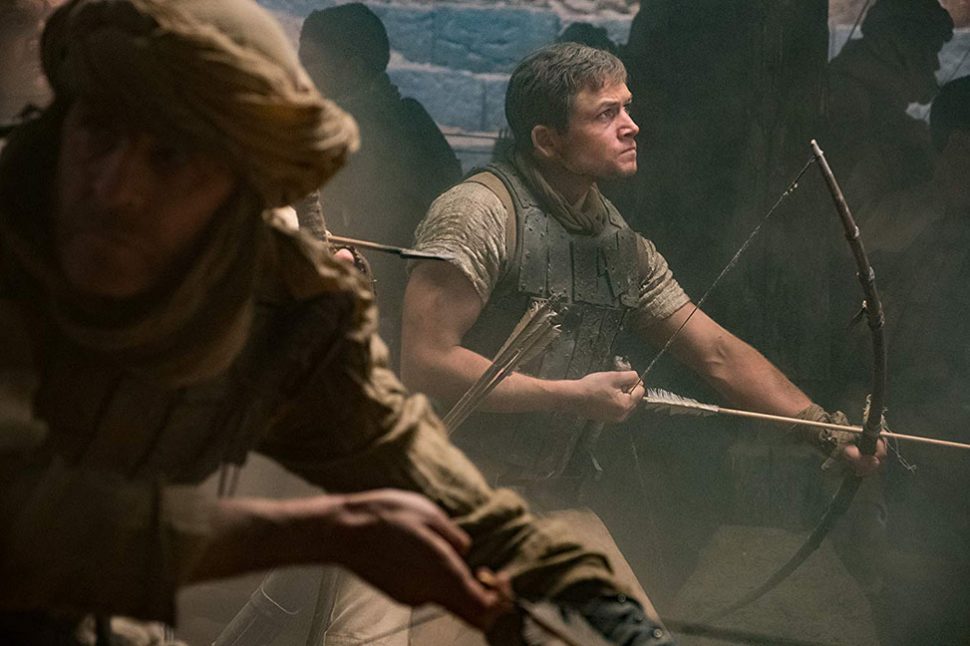
“Forget history, forget what you believe, forget what you know,” we’re urged by the hooded crusader himself. Except, he is not the Robin Hood of legend at the beginning of the film. He is, instead, a young, somewhat pugnacious, rich rascal. He’s drafted to fight in the Crusades and returns home a changed man, ready to…Well, I’m not quite sure actually because the film itself isn’t quite sure. The opening sets the film up as different from the tired old history, as a new and improved and much more eclectic “Robin Hood” and although it falters on the improvement quotient, it is definitely different. “Robin Hood” riffs on a number of genres and a number of films but the amalgamation of things that constitute its two-hour runtime are wholly its own. There’s nothing quite like it. Nothing could quite have prepared me for it. And nothing could have prepared me for my visceral dislike.
It would be simple to argue that the film’s general ignorance (wilful or deliberate, it’s uncertain) of geography, history, physics and politics signals its doom but this is not quite so. Anachronisms in film are as old as the medium itself. Rather, the film’s descent into mindless folly amidst an incessant visual freneticism is most marked in its inability to commit to anything. It’s a manifestation of the unsettled quality that has come to mark a great deal of modern blockbusters–a relentless onslaught of things. The film is shouting at us, whether it is in the battle sequences where arrows land with the velocity of bullets, whether it’s in scenes where characters bellow at each other for reasons unbeknownst to us—or them—or whether it’s in the murk ugliness of a final battle scene that is visually confusing. It’s first impulse is to jolt us so that we forget what just happened and cannot anticipate what will happen. And this is because the film itself has no interest in the present or in the now.
It’s no surprise that the film ends on a note of another story beginning. This is a prequel to the real story, because why not? We are expected to be waiting in anticipation of the sequel except “Robin Hood,” in its constant looking towards the future, forgets to establish the stakes of the now. For a film that bills itself as an action thriller, it is defiantly original in being markedly lacking in suspense or stakes.
We know that Robin will end up with his girl, even if another love-interest suggests limp competition. We know that he will come out of any issue unscathed and that things will end badly for the bad guys. Not so much because we’re familiar with the story but because nothing in the narrative invites us to take it seriously to actually build up care for the fates of these people. The actors are all drowning in the murkiness of the film around them. The smugness of Taron Egerton as our titular hero is overbearing. Jamie Foxx’s angry posturing as Little John is exhausting. And Ben Mendelsohn’s loudness as the Sheriff of Nottingham is tiring.
In some ways, “Robin Hood” is the best film to represent the worst impulses of blockbuster filmmaking in 2018. Much has been written about the crystallisation of sequels and remakes and re-imaginations and prequels as a constant in contemporary Hollywood. And there is more nuance to this situation than is sometimes allowed. The problem isn’t sequels or remakes – recent releases “Widows” and “The Kindergarten Teacher” are good examples of this. Even the entirely successful “Fantastic Beasts” franchise offers something beyond mere regurgitation. What “Robin Hood” typifies so brilliantly is regurgitation without style and almost without any thought. There is nothing this new version offers that feels valuable or significant. For the first time in 2018, I was tempted to leave the theatre because I did not care.
But it feels difficult to lay the blame at the feet of director Otto Bathurst and company. There seems to be an inevitability of needless remakes. Studios ignore the scores of storytellers yearning to tell their new stories only to stick their head in the sand, green lighting projects like this. Only last week, Disney teased another needless “live-action” (but mostly CGI) recreation of one of its animated classics, “The Lion King.” And the response has been overwhelmingly positive even as the teaser trailer is a mere shot for shot recreation of the hand-drawn animation of the original (something the original animators will get no residual royalties from because of the way Disney is set up). The creative industries feel stunted and “Robin Hood” feels like a natural extension of that stagnancy. Much has been made of its poor commercial response but this is a mere anomaly, because audiences have not shown themselves to be particularly averse to the Ouroboros of needless remakes.
So, this Robin of Loxley may have fallen foul of commercial favour but chances are in a few years another will rise to take us into the forest again.
I can’t wait.
Robin Hood is now playing at Caribbean Cinemas and Princess Movie Theaters.






